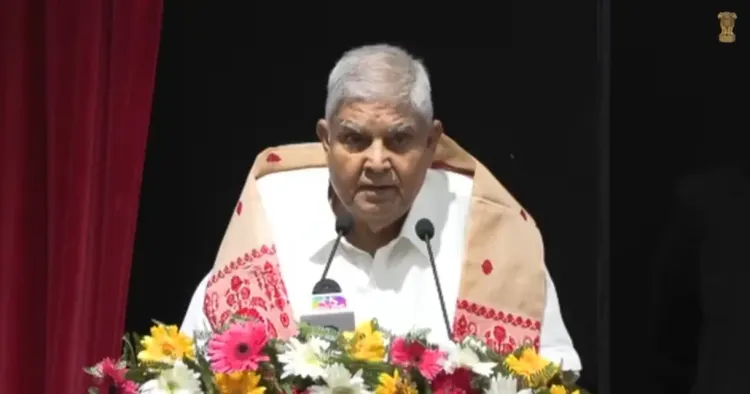How Can India Expand Its Soft Power?

Synopsis
Key Takeaways
- Soft power is a crucial asset for India’s global standing.
- Intellectual and cultural growth must accompany India’s rise.
- Collaboration among diverse academic fields is essential.
- Digitized repositories of classical texts are urgent priorities.
- Training programs for scholars should integrate modern methodologies.
New Delhi, July 10 (NationPress) Emphasizing the significance of enduring soft power as a vital asset in today’s global landscape, Vice President Jagdeep Dhankhar asserted on Thursday that India’s emergence as a powerful nation must coincide with an elevation of its intellectual and cultural stature.
Speaking at the opening of the Annual Conference on the Indian Knowledge System (IKS) in New Delhi, he remarked, “The might of a nation resides in the uniqueness of its ideas, the timelessness of its principles, and the strength of its intellectual heritage.”
Reasserting India’s identity beyond the limitations of post-colonial frameworks, the Vice President noted, “India is not merely a political entity established in the mid-20th century. It represents a civilizational continuum—a flowing river of consciousness, inquiry, and knowledge that has persisted.”
He added, “India should not only adopt global narratives, believing them to be inherently valuable. We must also partake in their formation, which can only be achieved by fostering an ecosystem that appreciates and rigorously explores our own traditions.”
To achieve this, we need institutions like JNU to spearhead this initiative. You ought to serve as the platforms for this significant intellectual rejuvenation, he stated.
The Vice President emphasized, “You need to cultivate environments where historians collaborate with coders, Sanskrit scholars work alongside biologists, and ethicists join forces with engineers. This conference marks a pivotal step towards establishing that ecosystem.”
Let’s direct our focus towards actionable outcomes. The establishment of digitized repositories for classical Indian texts is an urgent necessity, encompassing languages such as Sanskrit, Tamil, Pali, and Prakrit, he asserted.
Dhankhar stated, “These repositories should be readily accessible, allowing scholars in India and researchers globally to engage significantly with these materials.”
He highlighted the importance of creating training programs aimed at equipping young scholars with solid methodological tools—integrating philology, computational analysis, ethnography, and comparative inquiry to enhance their engagement with Indian Knowledge Systems.
Addressing the historical neglect of indigenous wisdom, he remarked, “Indigenous knowledge was often dismissed as remnants of a primitive past, not due to misinterpretation.”
“It was a structure of erasure, destruction, and decimation. Even more regrettably, this selective amnesia persisted post-Independence. Western frameworks were presented as universal truths. To be more candid, falsehood was disguised as reality,” he stated.










